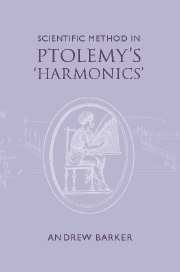Book contents
- Frontmatter
- Contents
- Preface
- 1 Introduction
- 2 Reason and perception
- 3 Pitch and quantity
- 4 The ratios of the concords: (1) the Pythagoreans
- 5 The ratios of the concords: (2) Ptolemy's hupotheseis
- 6 Critique of Aristoxenian principles and conclusions
- 7 Ptolemy on the harmonic divisions of his predecessors
- 8 Melodic intervals: hupotheseis, derivations and adjustments
- 9 Larger systems: modulations in music and in method
- 10 The instruments
- 11 The tests
- 12 Harmonics in a wider perspective
- Bibliography
- Index of names
- Index of topics
4 - The ratios of the concords: (1) the Pythagoreans
Published online by Cambridge University Press: 22 September 2009
- Frontmatter
- Contents
- Preface
- 1 Introduction
- 2 Reason and perception
- 3 Pitch and quantity
- 4 The ratios of the concords: (1) the Pythagoreans
- 5 The ratios of the concords: (2) Ptolemy's hupotheseis
- 6 Critique of Aristoxenian principles and conclusions
- 7 Ptolemy on the harmonic divisions of his predecessors
- 8 Melodic intervals: hupotheseis, derivations and adjustments
- 9 Larger systems: modulations in music and in method
- 10 The instruments
- 11 The tests
- 12 Harmonics in a wider perspective
- Bibliography
- Index of names
- Index of topics
Summary
Ptolemy mentions by name rather few of his predecessors. When he does, it is seldom to record his debts, though some of them emerge clearly enough, as we shall see. His first major topic is the musical concords; and he sets out the approaches of two schools of thought on this matter in some detail, mainly to criticise them. The strategy is designed to throw into sharper relief his own procedures and their merits, and his treatment of the issues is linked very closely to his criticisms of theirs. But the roles of the two critiques in his wider enterprise are different. Only one of them will be discussed in this chapter. (For the other, see Chapter 6.)
In considering what Ptolemy says about these earlier theorists, one of my aims is similar to his own. A study of his criticisms will clarify the challenges which his own procedures must meet, and will provide a yardstick by which we can judge their success from his point of view. But at the same time I shall draw attention to ways in which some of Ptolemy's own views turn out to be developments or refinements of ones he criticises, though he is never quite explicit in acknowledging the fact. His borrowings are worth mentioning not merely to elucidate his intellectual biography, or in the spirit of Porphyry's Commentary, to convict Ptolemy of surreptitious plagiarism.
- Type
- Chapter
- Information
- Scientific Method in Ptolemy's Harmonics , pp. 54 - 73Publisher: Cambridge University PressPrint publication year: 2001



